The use of smart machines and sensors enables more efficient and sustainable farming. Our white paper shows how the networking of devices succeeds thanks to ISOBUS-compliant development.
Agriculture 4.0
An interconnected approach to use the most innovative digital technologies and enable operators in the agricultural sector to optimise production processes and improve resource management.
Data-driven sustainability
The essential connection between technology and sustainability
Promoting sustainable agriculture, combatting climate change and land degradation, halting the loss of biodiversity, ending hunger and guaranteeing food security, reducing social inequality. This is the global challenge in which contemporary agriculture plays a crucial role.
In this scenario, technological innovation has proven itself to be the decisive ally of the sector, in the production and distribution of agricultural products and knowledge. Contemporary agriculture borrows the logic of Industry 4.0, combining the technologies typical of Interconnected Agriculture and Precision Farming, such as the Internet of Things, the Internet of Farming, Big Data Analytics and Blockchain.
Thanks to this approach, Smart Agriculture contributes significant improvements to the sector, with a strong economic, environmental and social impact. Examples include making more effective use of phytosanitary products or reducing diesel consumption, with advantages in terms of cost savings, a reduction of CO2 emissions into the atmosphere and subsequent reputational repercussions and marketing returns for the farmers, considering the growing sensitivity of consumers to these issues.
Sustainability strongly depends on the ability to make the best possible use of available resources, as well as optimising processes and information flows from farm-to-fork. It is in this perspective that Reply positions its Agriculture 4.0 approach and the concept of sustainable development.
SMART AGRICULTURE MARKET VALUE
US$ 22 bn
IN 2025
Source: www.prnewswire.com
The approach developed by Reply
To support operators in the agricultural sector along the path of ecological and digital transition, Reply has defined three pillars for Agriculture 4.0.
Measure
Solutions for the monitoring and close measurement of agricultural activities: from cultivation processes, to the impact of climatic and environmental factors, extracting as much information from the data available and to create value.
Decide
Data-driven technological infrastructure designed to enhance the analytical capacity and the strategic vision of actors in the agricultural sector. This takes the decision-making processes and makes them more complete, timely and up to date.
Act
Technologies aimed at providing farmers with operational support in the field, taking full advantage of the knowledge generated in the earlier stages: from process automation, to the interconnection between tools.
REPLY USE CASE
Intelligent cultivation of hops
)
In Italy, the cultivation of hops is a niche market associated with very high growth rates. Unsurprisingly, an increasing number of national beer producers are choosing to rely on Made in Italy and locally sourced 0 km raw materials.
Reply and the Department of Food and Drug Sciences (Professor Tommaso Ganino and Dr. Margherita Rodolfi) of the University of Parma have initiated a collaboration aimed at creating a research and digital transformation programme dedicated to the cultivation of hops. The mission is to help growers generate value using digital technologies.
In particular, the issue of treatments assumes a crucial role for the farmer since, if the agricultural land is not properly defended, the risk of losing a significant part of the crops is quite serious. On the other, excessive use of phytosanitary products can compromise the quality and environmental sustainability of crops.
Such decisions require close monitoring of numerous parameters, many of which are not easy to measure and cannot be controlled by farmers. This includes the environmental conditions of the land, meteorological factors, the state of the soil and the growth of the plant, and mor.
)
These parameters need to be monitored closely on an ongoing basis and the management of such complexities is where Reply and the University of Parma concentrates its efforts.
The synergy between the University's agronomic know-how and Reply’s technological and digital expertise has made it possible: to define a Digital Development 4.0 Plan aimed at the cultivation of hops. Starting from the analysis of decision-making needs and data that is currently available, the plan provides for a series of short-, medium- and long-term projects capable of evolving field management practices with an increasing focus on 4.0 and data-driven agriculture.
The collaboration is under way, with the first phase of the Roadmap (relating to short-term projects) completed. Reply‘s support does not end with the creation of technological infrastructures and software solutions. It also includes the continuous training of advanced algorithms in order to generate value-added insights, enhancing the decision making ability of key decision makers and directing them towards more correct and sustainable choices.
)
Ongoing Agritech Revolution:
areas of application with high potential for technological development
An integrated technological approach is needed to maximise the impact of digitisation and to seize the opportunities offered by the 4.0 paradigm in full. To identify the most suitable solution, it is necessary to carefully consider the characteristics of the specific crop, the size of the cultivated area and the processes involved.
Defence
Digital technologies enable new preventive approaches that promptly identify the very first symptoms associated with a pathology and take prompt action where necessary.
Irrigation
It is possible to gain a better understanding of the soil behaviour, to detect loss of homogeneity and exposure to water stress, to optimise the use of water, irrigating only where it is needed and reducing waste.
Harvesting
Digital technologies provide decisive support. They enable farmers to monitor fields continuously and identify the optimal timeframes within which to harvest, with greater assurance of a good quality product.
Prediction
Being able to know the yield of an agricultural plot in terms of productivity and quality, in advance and at an opportune time, offers farmers a greater capacity for strategic vision and facilitates the management and organisation of activities.
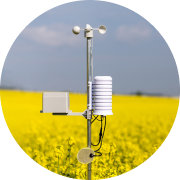
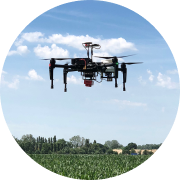
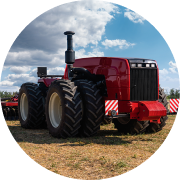
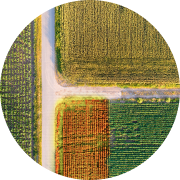
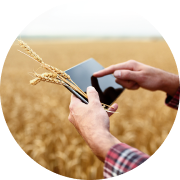
;Resize,width=1660)